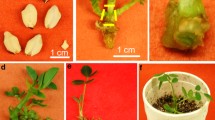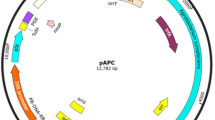Abstract
Snapdragon (Antirrhinum majus L.) is a popular ornamental and model plant species, and the recently released reference genome could greatly boost its utilization in fundamental research. However, the lack of an efficient genetic transformation system is still a major limiting factor for its full application in genetic and molecular studies. In this study, a simple method for quick regeneration and efficient Agrobacterium-mediated transformation of snapdragon was developed. Cotyledon petiole and hypocotyl explants derived from two-week-old seedlings were cultured on MS media supplemented with 2 mg/L zeatin (ZT), 0.2 mg/L 1-naphthaleneacetic acid (NAA), and 2 mg/L AgNO3, and adventitious shoots were regenerated through organogenesis with an average regeneration of 48.00% and 41.33%, respectively. By contrast, the regeneration frequency was only 22.67% for cotyledon petiole and 25.67% for hypocotyl explants in the absence of AgNO3. Moreover, the application of AgNO3 promoted indirect shoot organogenesis, while direct shoot organogenesis occurred in the absence of AgNO3 from both hypocotyl or cotyledon petiole explants. Agrobacterium-mediated genetic transformation systems were developed with this high-efficient regeneration system. The transformation efficiency has been improved from 0 to 1% through the direct shoot organogenesis to 3 to 4% via the indirect shoot organogenesis. This efficient regeneration and genetic transformation method could be important for future use of snapdragon as a model plant to address some fundamental questions which are hard to be solved by using other model plant species, and to accelerate the breeding process through CRISPR/Cas9 genome editing.
Key message
Genetic transformation of snapdragon was significantly improved by applying AgNO3 to induce indirect organogenesis, which will substantially facilitate its fundamental research as well as molecular breeding.





Similar content being viewed by others
Data availability
All data, and material generated or used during the study appear in the submitted article.
Code availability
No code was generated or used during the study.
Abbreviations
- ZT:
-
Zeatin
- NAA-1:
-
Naphthaleneacetic acid
- GA:
-
Gibberellin
- MS:
-
Murashige and Skoog media
References
Alonso JM, Stepanova AN, Leisse TJ, Kim CJ, Chen H, Shinn P, Stevenson DK, Zimmerman J, Barajas P, Cheuk R (2003) Genome-wide insertional mutagenesis of Arabidopsis thaliana. Science 301(5633):653–657. https://doi.org/10.1126/science.1086391
Atkinson NJ, Fordlloyd BV, Newbury HJ (1989) Regeneration of plants from Antirrhinum majus L Callus. Plant Cell Tiss Org Cult 17(1):59–70. https://doi.org/10.1007/BF00042282
Banerjee AK, Prat S, Hannapel DJ (2006) Efficient production of transgenic potato (S. tuberosum L. ssp. andigena) plants via Agrobacterium tumefaciens-mediated transformation. Plant Sci 170(4):732–738. https://doi.org/10.1016/j.plantsci.2005.11.007
Carpenter R, Coen ES (1990) Floral homeotic mutations produced by transposon-mutagenesis in Antirrhinum majus. Gene Dev 4(9):1483–1493. https://doi.org/10.1101/Gad.4.9.1483
Castel B, Tomlinson L, Locci F, Yang Y, Jones JD (2019) Optimization of T-DNA architecture for Cas9-mediated mutagenesis in Arabidopsis. PLoS ONE 14(1):e0204778. https://doi.org/10.1371/journal.pone.0204778
Chakrabarty R, Viswakarma N, Bhat S, Kirti P, Singh B, Chopra V (2002) Agrobacterium-mediated transformation of cauliflower: optimization of protocol and development of Bt-transgenic cauliflower. J Biosci 27(5):495–502
Chi G-L, Pua E-C (1989) Ethylene inhibitors enhanced de novo shoot regeneration from cotyledons of Brassica campestris ssp. chinensis (Chinese cabbage) in vitro. Plant Sci 64(2):243–250. https://doi.org/10.1016/0168-9452(89)90030-7
Classic Murashige TS, Koog F (1962) A revised medium for rapid growth and bioassays with tobacco tissue cultures. Physiol Plant 15:473–497
Collado R, Bermudez-Caraballoso I, Garcia LR, Veitia N, Torres D, Romero C, Angenon G (2016) Epicotyl sections as targets for plant regeneration and transient transformation of common bean using Agrobacterium tumefaciens. Vitro Cell Dev Biol Plant 52(5):500–511. https://doi.org/10.1007/s11627-016-9769-2
Cui ML, Ezura H, Nishimura S, Kamada H, Handa T (2004) A rapid Agrobacterium-mediated transformation of Antirrhinum majus L. by using direct shoot regeneration from hypocotyl explants. Plant Sci 166(4):873–879. https://doi.org/10.1016/j.plantsci.2003.11.021
Cui ML, Takayanagi K, Kamada H, Nishimura S, Handa T (2000) Transformation of Antirrhinum majus L. by a rol-type multi-auto-transformation (MAT) vector system. Plant Sci 159(2):273–280. https://doi.org/10.1016/S0168-9452(00)00351-4
De Block M (1988) Genotype-independent leaf disc transformation of potato (Solanum tuberosum) using Agrobacterium tumefaciens. Theor Appl Genet 76(5):767–774
Del GS, Manfioletti G, Schneider C (1989) The CTAB-DNA precipitation method: a common mini-scale preparation of template DNA from phagemids, phages or plasmids suitable for sequencing. Biotechniques 7(5):514–520
Dhekney SA, Li ZJT, Gray DJ (2011) Grapevines engineered to express cisgenic Vitis vinifera thaumatin-like protein exhibit fungal disease resistance. Vitro Cell Dev-Pl 47(4):458–466. https://doi.org/10.1007/s11627-011-9358-3
Ezura H, Yuhashi KI, Yasuta T, Minamisawa K (2000) Effect of ethylene on Agrobacterium tumefaciens-mediated gene transfer to melon. Plant Breed 119(1):75–79. https://doi.org/10.1046/j.1439-0523.2000.00438.x
Gao H, Xia X, An L, Xin X, Liang Y (2017) Reversion of hyperhydricity in pink (Dianthus chinensis L.) plantlets by AgNO3 and its associated mechanism during in vitro culture. Plant Sci 254:1–11. https://doi.org/10.1016/j.plantsci.2016.10.008
Garcia-Rivera J, Casadevall A (2001) Melanization of Cryptococcus neoformans reduces its susceptibility to the antimicrobial effects of silver nitrate. Med Mycol 39(4):353–357. https://doi.org/10.1080/714031043
Handa T (1992) Genetic-transformation of Antirrhinum majus L and inheritance of altered phenotype induced by Ri T-DNA. Plant Sci 81(2):199–206. https://doi.org/10.1016/0168-9452(92)90043-L
Heidmann I, Efremova N, Saedler H, Schwarz-Sommer Z (1998) A protocol for transformation and regeneration of Antirrhinum majus. Plant J 13(5):723–728. https://doi.org/10.1046/j.1365-313X.1998.00058.x
Hoshino Y, Turkan I, Mii M (1998) Transgenic bialaphos-resistant snapdragon (Antirrhinum majus L.) produced by Agrobacterium rhizogenes transformation. Sci Hortic-Amsterdam 76(1–2):37–57. https://doi.org/10.1016/S0304-4238(98)00130-7
Hudson A, Critchley J, Erasmus Y (2008) The genus antirrhinum (snapdragon): a flowering plant model for evolution and development. CSH Protoc. https://doi.org/10.1101/pdb.emo100
Kim Y, Schumaker KS, Zhu JK (2006) EMS mutagenesis of Arabidopsis. Methods Mol Biol 323:101–103. https://doi.org/10.1385/1-59745-003-0:101
Koornneef M, Dellaert LWM, Vanderveen JH (1982) Ems-Induced and radiation-induced mutation frequencies at individual loci in Arabidopsis thaliana (L) Heynh. Mutat Res 93(1):109–123. https://doi.org/10.1016/0027-5107(82)90129-4
Li M, Zhang D, Gao Q, Luo Y, Zhang H, Ma B, Chen C, Whibley A, Zhang Y, Cao Y, Li Q, Guo H, Li J, Song Y, Zhang Y, Copsey L, Li Y, Li X, Qi M, Wang J, Chen Y, Wang D, Zhao J, Liu G, Wu B, Yu L, Xu C, Li J, Zhao S, Zhang Y, Hu S, Liang C, Yin Y, Coen E, Xue Y (2019) Genome structure and evolution of Antirrhinum majus L. Nat Plants 5(2):174–183. https://doi.org/10.1038/s41477-018-0349-9
Liu X, Wu X, Adhikari PB, Zhu S, Kinoshita Y, Berger F, Higashiyama T, Kasahara RD (2020) Establishment of a novel method for the identification of fertilization defective mutants in Arabidopsis thaliana. Biochem Biophys Res Commun 521(4):928–932. https://doi.org/10.1016/j.bbrc.2019.11.028
Mizzotti C, Galliani BM, Dreni L, Sommer H, Bombarely A, Masiero S (2017) ERAMOSA controls lateral branching in snapdragon. Sci Rep 7:41319. https://doi.org/10.1038/srep41319
Mohiuddin A, Abdullah ZC, Chowdhury M, Napis S (2005) Enhancement of adventitious shoot regeneration in Cucumis sativus L. using AgNO3. Plant Tissue Cult 15(1):15–23
Moradpour M, Aziz M, Abdullah S (2016) Establishment of in vitro culture of rubber (Hevea brasiliensis) from field-derived explants: effective role of silver nanoparticles in reducing contamination and browning. J Nanomed Nanotechnol 7(375):2. https://doi.org/10.4172/2157-7439.1000375
Mukeshimana G, Ma YM, Walworth AE, Song GQ, Kelly JD (2013) Factors influencing regeneration and Agrobacterium tumefaciens-mediated transformation of common bean (Phaseolus vulgaris L.). Plant Biotechnol Rep 7(1):59–70. https://doi.org/10.1007/s11816-012-0237-0
Nonaka S, Yuhashi K, Takada K, Sugaware M, Minamisawa K, Ezura H (2008) Ethylene production in plants during transformation suppresses vir gene expression in Agrobacterium tumefaciens. New Phytol 178(3):647–656. https://doi.org/10.1111/j.1469-8137.2008.02400.x
Pestana M, Lacorte C, De Freitas V, De Oliveira D, Mansur E (1999) In vitro regeneration of peanut (Arachis hypogaea L.) through organogenesis: effect of culture temperature and silver nitrate. Vitro Cell Dev Biol-Plant 35(3):214–216
Ricketts CR, Lowbury EJL, Lawrence JC, Hall M, Wilkins MD (1970) Mechanism of prophylaxis by silver compounds against infection of burns. Brit Med J. https://doi.org/10.1136/bmj.2.5707.444
Roustan J-P, Latche A, Fallot J (1990) Control of carrot somatic embryogenesis by AgNO3, an inhibitor of ethylene action: effect on arginine decarboxylase activity. Plant Sci 67(1):89–95. https://doi.org/10.1016/0168-9452(90)90054-R
Roustan J-P, Latche A, Fallot J (1992) Enhancement of shoot regeneration from cotyledons of Cucumis melo by AgNO3, an inhibitor of ethylene action. J Plant Physiol 140(4):485–488. https://doi.org/10.1016/S0176-1617(11)80830-8
Safavi K, Esfahanizadeh M, Mortazaeinezahad DH, Dastjerd H (2011) The study of nano silver (NS) antimicrobial activity and evaluation of using NS in tissue culture media. In: Proceedings of the International conference on life science and technology IPCBEE, 2011, vol 3, pp 159–161
Schwarz-Sommer Z, Davies B, Hudson A (2003) An everlasting pioneer: the story of Antirrhinum research. Nat Rev Genet 4(8):657–666. https://doi.org/10.1038/nrg1127
Senior I, Holford P, Cooley RN, Newbury HJ (1995) Transformation of Antirrhinum majus using Agrobacterium rhizogenes. J Exp Bot 46(290):1233–1239. https://doi.org/10.1093/jxb/46.9.1233
Seong ES, Song KJ, Jegal S, Yu CY, Chung IM (2005) Silver nitrate and aminoethoxyvinylglycine affect Agrobacterium-mediated apple transformation. Plant Growth Regul 45(1):75–82. https://doi.org/10.1007/s10725-004-6126-y
Sommer H, Hehl R, Krebbers E, Piotrowiak R, Lönnig W-E, Saedler H (1988) Transposable elements of Antirrhinum majus. Plant transposable elements. Springer, New York, vol 47, pp 227–235. https://doi.org/10.1007/978-1-4684-5550-2_16
Waites R, Selvadurai HR, Oliver IR, Hudson A (1998) The PHANTASTICA gene encodes a MYB transcription factor involved in growth and dorsoventrality of lateral organs in Antirrhinum. Cell 93(5):779–789. https://doi.org/10.1016/s0092-8674(00)81439-7
Wu L, Wei Y, Zheng Y (2006) Effects of silver nitrate on the tissue culture of immature wheat embryos. Russ J Plant Physiol 53(4):530–534. https://doi.org/10.1134/S1021443706040157
Funding
The funding was provided by USDA-NIFA Award No. 2019–67013-29236; The National Natural Science Foundation of China (31772290).
Author information
Authors and Affiliations
Corresponding author
Ethics declarations
Conflict of interest
We declare that we do not have any commercial or associative interest that represents a conflict of interest in connection with the work submitted.
Additional information
Communicated by Ming-Tsair Chan.
Publisher's Note
Springer Nature remains neutral with regard to jurisdictional claims in published maps and institutional affiliations.
Electronic supplementary material
Below is the link to the electronic supplementary material.
Rights and permissions
About this article
Cite this article
Lian, Z., Nguyen, C.D., Wilson, S. et al. An efficient protocol for Agrobacterium-mediated genetic transformation of Antirrhinum majus. Plant Cell Tiss Organ Cult 142, 527–536 (2020). https://doi.org/10.1007/s11240-020-01877-4
Received:
Accepted:
Published:
Issue Date:
DOI: https://doi.org/10.1007/s11240-020-01877-4




